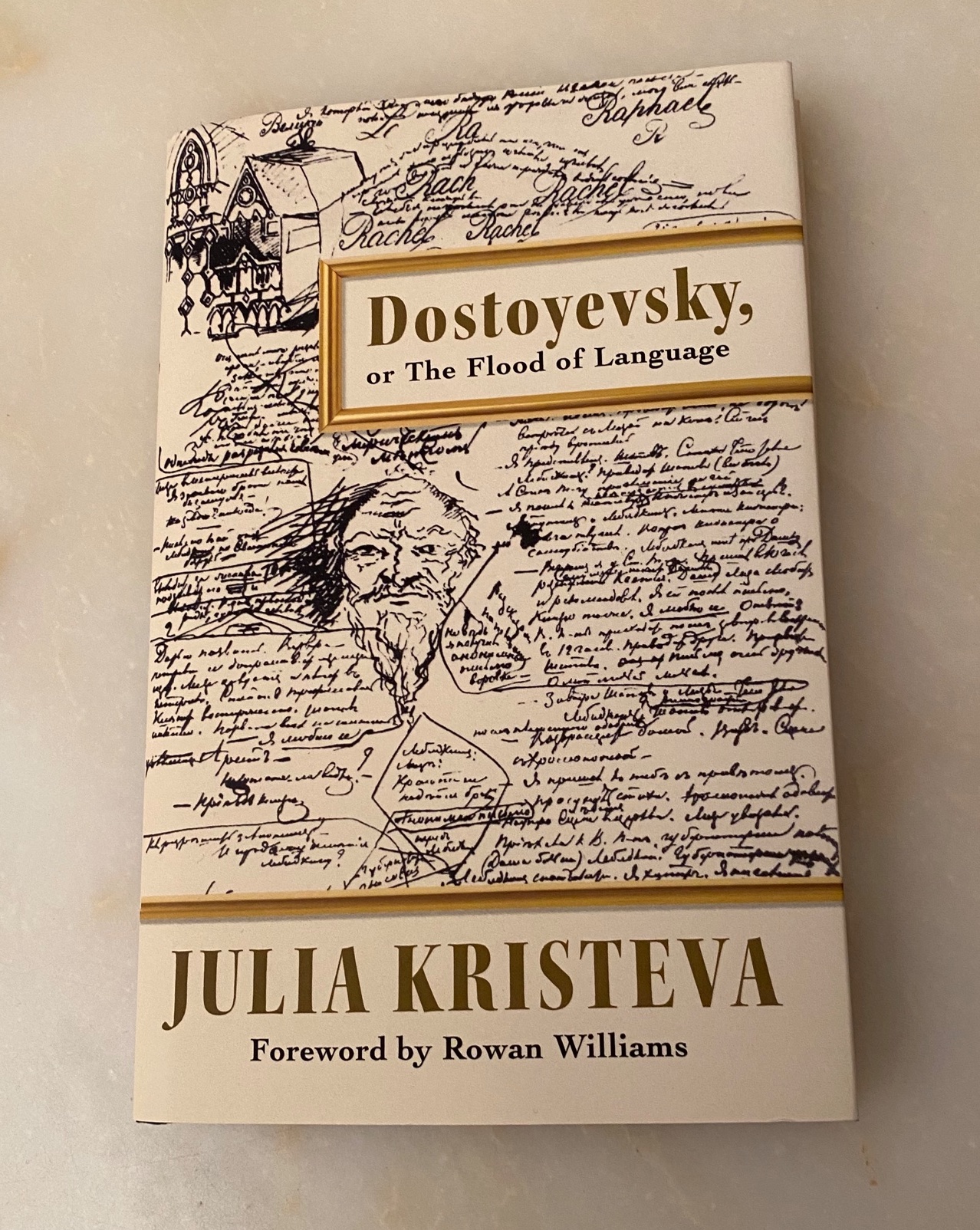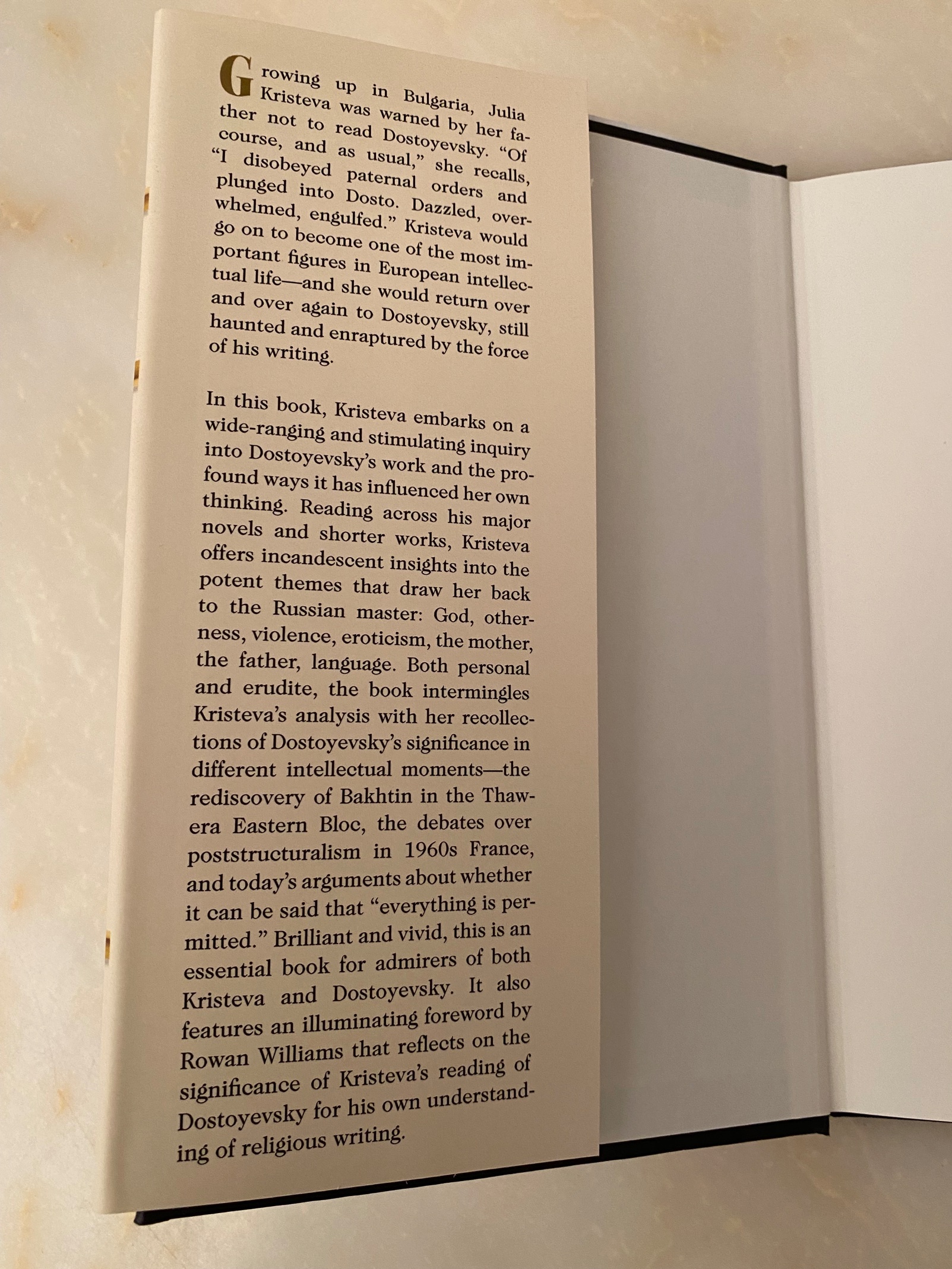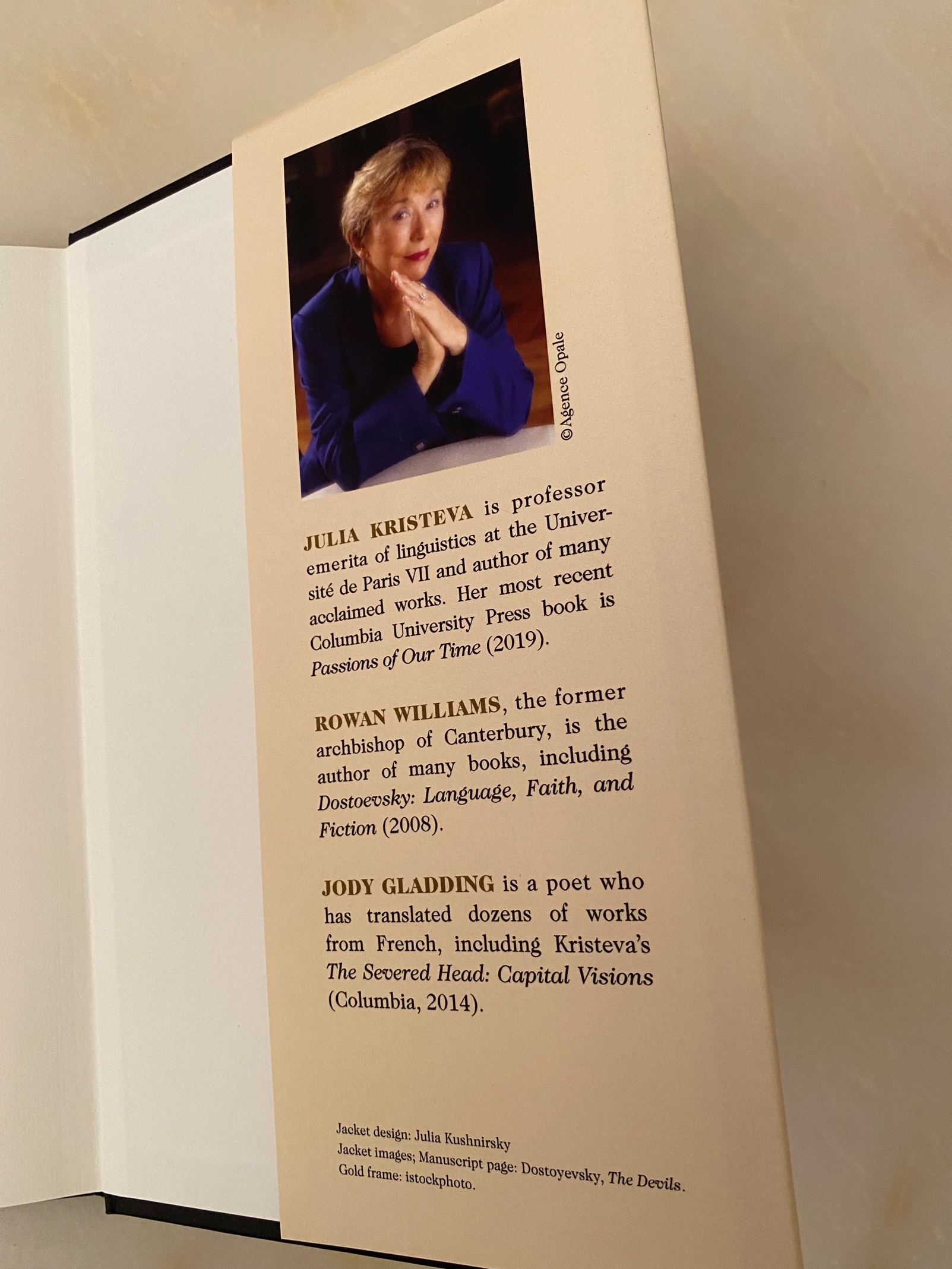|
Dostoyevsky, or The Flood of Language
Julia Kristeva. Translated by Jody Gladding. Foreword by Rowan Williams.
Columbia University Press
Growing up in Bulgaria, Julia Kristeva was warned by her father not to read Dostoyevsky. “Of course, and as usual,” she recalls, “I disobeyed paternal orders and plunged into Dosto. Dazzled, overwhelmed, engulfed.” Kristeva would go on to become one of the most important figures in European intellectual life—and she would return over and over again to Dostoyevsky, still haunted and enraptured by the force of his writing.
In this book, Kristeva embarks on a wide-ranging and stimulating inquiry into Dostoyevsky’s work and the profound ways it has influenced her own thinking. Reading across his major novels and shorter works, Kristeva offers incandescent insights into the potent themes that draw her back to the Russian master: God, otherness, violence, eroticism, the mother, the father, language itself. Both personal and erudite, the book intermingles Kristeva’s analysis with her recollections of Dostoyevsky’s significance in different intellectual moments—the rediscovery of Bakhtin in the Thaw-era Eastern Bloc, the debates over poststructuralism in 1960s France, and today’s arguments about whether it can be said that “everything is permitted.” Brilliant and vivid, this is an essential book for admirers of both Kristeva and Dostoyevsky. It also features an illuminating foreword by Rowan Williams that reflects on the significance of Kristeva’s reading of Dostoyevsky for his own understanding of religious writing.
Part spiritual autobiography, part free association, Kristeva’s study of Dostoyevsky becomes the occasion for a journey through the life of the mind. In searing harmony with her subject, she once again demonstrates how it is only out of the depths of abjection that human creativity is born. One of her most exuberant and challenging works, Dostoyevsky, or The Flood of Language offers us Dostoyevsky as lascivious, blasphemous, and saint, taking us into the core of Kristeva’s unique vision. Jacqueline Rose, author of On Violence and On Violence Against Women
Dostoevsky, as Kristeva’s reminder about language and the sacred helps us guess, loves religious mischief precisely because he cares so much about religious faith. Michael Wood, London Review of Books
Dostoyevsky scholars will find this worth a look. Publishers Weekly
CONTENTS
Kristeva’s Dostoyevsky: The Arrival of the Human, by Rowan Williams
Preface
Can You Like Dostoyevsky?
Crimes and Pardons
The God-Man, the Man-God
The Second Sex Outside of Sex
Children, Rapes, and Sensual Pleasures
Everything Is Permitted
Notes
Index
ABOUT THE AUTHOR
Julia Kristeva is professor emerita of linguistics at the Université de Paris VII and author of many acclaimed works. Her most recent Columbia University Press book is Passions of Our Time (2019).
Rowan Williams, the former archbishop of Canterbury, is the author of many books, including Dostoevsky: Language, Faith, and Fiction (2008).
Jody Gladding is a poet who has translated dozens of works from French, including Kristeva’s The Severed Head: Capital Visions (Columbia, 2014).
https://cup.columbia.edu/book/dostoyevsky-or-the-flood-of-language/9780231203326
Kristeva's
Dostoyevsky: The Arrival of the Human
by
Rowan Williams
…
Julia Kristeva's reading of Dostoyevsky is, in effect,
a tour de force of linking this particular novelist's practice with the
fundamentals of the psyche as a linguistic reality. It is a reading that pulls
together the impact of the familiar Bakhtinian theme of Dostoyevsky's
"polyphonic" method, the centrality of dialogical exchange, and the
less fully explored idea of the narrative writer as consciously holding
themselves and the reader on the verge of the "empty center" of
speech. They are in fact perspectives that belong together: if the essence of
Bakhtinian dialogue is that everything and everyone is "at the
frontier" of its opposite, this means that any determinate identity in the
speech- world will be shaped by its refusal of what it is not; it is
haunted by the unrealized potential of what has not been chosen and spoken. A
dialogical and polyphonic form of "telling" allows a to- and- fro between what is said and not- said, what is chosen and
what is denied, by voicing different speakers. And Dostoyevsky is famously in
love with creating pairings, twinnings between
characters— most dramatically perhaps with Myshkin/ Rogozhin and Nastasya/Aglaya in The Idiot and with the images of abusive
and nurturing fatherhood in Fyodor and Zosima in Karamazov.
...
One of Kristeva's basic insights is thus to do with
what Dostoyevsky's fiction tells us about writing itself, and narrative writing
in particular: the significant and durable fiction is one in which we are aware
of the central void at the origins of speech and the touch that crosses it— not
a touch uniting two isolated substances but one that constitutes substance and
subject precisely in that moment. As the subject develops from this
point, it can remain "in touch" with the originating touch only by
the deferral and mediation of desire, which steers away from any collapse into
a "fruition" that is simply the absorption of otherness into
sameness. And our relations with other desiring subjects, both taught by
them and contesting them, are all in one way or another involved with
negotiating these deferrals and mediations so that they sustain life.
…
ROWAN WILLIAMS, Excerpted from the Foreword : Kristeva’s Dostoyevsky: The Arrival of the Human.
Can You Like Dostoyevsky?
Julia Kristeva
Eyes fixed
on the Bulgarian editions of The Idiot(1869), Demons (1872),
and The BrothersKaramazov (1880), my father
advised me strongly against reading them: “Destructive, demonic, clinging, too
much is too much, you won’t like him at all, let it go!” He dreamed of seeing
me escape “the bowels of hell,” as he called our native Bulgaria, quoting some
obscure verse in the Holy Scriptures. To fulfill this desperate plan, I only
had to develop my “innate taste” for clarity and freedom, according to him, in
French, of course, since he had introduced me to the language of La Fontaine
and Voltaire. In addition to the language of our “great Russian brother,” which
was imposed upon us “naturally.” At that time, the ruling ideology taunted the
“religious obscurantism” of the writer, “an enemy of the people,” even though,
behind the Stalinist scenes, devoted specialists continued to extol his
mysteries with a passion: his “immersion” (proniknovenie) in self and
other (Vyacheslav Ivanov), the “plurality of his worlds” in the manner of
Einstein (Leonid Grossman), his “Shakespearean polyphony” (A. V. Lunacharsky),
and so on. Of course, and as usual, I disobeyed paternal orders and plunged
into Dosto. Dazzled, overwhelmed, engulfed.
I will never
forget the staggering effect of reading the two conversations between
Raskolnikov and Sonya and their exchange of the cross in Crime and Punishment (1866).
Did she guess that he himself did not really know what he had done? Crime or
delirium, the murder of Alyona Ivanovna, lowly pawnbroker and “rich as a Yid,”
had wrested the “detective novel” from popular literature and revealed the
wretchedness and abjection of our century. And the cross that the nervous
student rejected and then finally accepted: Was it Sonya’s cross or in fact the
one she had received from Liza, the second victim?
This gift of
a gift, this pardon, did he link it—both fascinated and disgusted—with his own
feminine tendencies? To succeed with the revival of his hero’s destiny, with
“Napoleon in view,” Rodion hallucinated the ultimate freedom of a “louse”
becoming “superman” by murdering a superfluous human being.
“Everywhere
and in all things I lived at the ultimate limit, and I spent my life surpassing
it,” Dostoyevsky wrote to his friend A. N. Maykov in that same period (1867). I
could understand, envy, question. But living in the
text, this jostling of norms and laws to the point of obliterating the
“ultimate limit”? I was in over my head.
Later,
rediscovering Dostoyevsky in French, I stumbled onto a passage in A Writer’s Diary(1877)
mentioning the fate of a neologism of his own invention, which he had
introduced in The Double (1846) and which
Turgenev, his unbearable and admired rival, had used abundantly since: stushevatsya (“to
disappear,” “to annihilate,” from the Russian tush, in German Tusch,
referring to India ink). The engineering student who applied himself to
sketching various drafts, plans, and military constructions, drawn and washed
with India ink, excelled in the art of “reducing a dark drawing to white and to
nothingness.” “Imperceptible erasure into nonbeing,” like the evasive,
vanishing subject that was the young Dostoyevsky himself. To one who wished to
hear it, his neologism revealed the exquisite excitement retained in the
written gesture, the extenuated sound of his voice engraved in the map of the
mother tongue, the sensual pleasure of being “the wound and the knife,” the
sharp stylet that scarifies, control and collapse conjoined. Or how to
“annihilate oneself with fluidity.”
But it is
neither an “elegant ink wash” nor a painting on Chinese silk that stushevatsya produces
as penned by Dostoyevsky. That word permeates the pitiful embraces of the elder
Golyadkin and his double, the younger Golyadkin (The Double,
1846). It oozes into the “sin” that pierces
them, tickles the fleeting “glance,” brushes against the
crowd that “surrounds” them, then “gives way”
delightfully, like “pâté in the mouth”
of its shadow, substitute filth. . . . In the discreet polyphony of this
neologism, I thus perceived what A Writer’s Diary (1877)
did not say but what the novelistic swell of the entire opus insidiously sweeps
along with it: the triumphant expansion of sentences released with the last breath
(tush in Russian also means “fanfare”); the convulsive saraband of
consumed bodies (“tusha” refers to “flesh” and “meat”; “tushit’”
means “extinguish” or “smother”); seductions, lures, and the sensual pleasure
of the catch; or the caressing pictorial technique. In French, toucher (“to
touch”) is charming when we find something “touching” or are “touched” by it
but becomes questionable in faire unetouche (to
hit on someone). Irrefutable pleasures of writing.
The young student of French philology and comparative
literature did not know that she was captive to this tushenie / stushevatsya. I
was knocked flat. And I ran to find again my La Fontaine, Voltaire, and Hugo,
which would lead me to Sartre, Beauvoir, Camus, Blanchot, the nouveau roman,
Sollers. An exile as exhausting as hard labor underground in Dosto’s white
nights, but different. Sharp-edged intoxication of pleasure, lucid sublimation
of French, in French, and risky freedom as singular transcendence.
Then the second edition of the book by Mikhail Bakhtin, Problems of Dostoyevsky’s Poetics(1929–1963),
appeared in Russian, a major event for specialists, amateurs, and many others.
This was the thaw. The promised freedom of thought was slow to
arrive, but it crept into literary theory and criticism, secret lung of a
suffocated philosophy.
The initiated had been familiar with the first edition for a
long time, but with this new one, Bakhtin’s Dostoyevsky became a social
phenomenon, a political symptom. At the center of this new furor was my friend
and mentor, Tzvetan Stoyanov, well-known literary critic, anglophone,
francophone, and obviously russophone. He had already introduced me to
Shakespeare and Joyce, Cervantes and Kafka, the Russian formalists and the
breakthrough postformalism of a certain Bakhtin. Now we could reimmerse
ourselves, day and night, out loud and in Russian, Bakhtin’s book in hand, in
the novels of Dostoyevsky. I heard the vocal power of tragic laughter, the
farce within the force of evil, and that contagious, drunken flow of dialogues
composed as story that Bakhtin calls slovo, translated as mot (word)
in French. Through the vocabulary and syntax, I heard, as Logos incarnate, the
Word stirring biblical deliverance into a new multivocal, multiversal
narration:
“I am full of words, the spirit within me constrains me;
inside I am like wine that has no vent, like wine that bursts from new
wineskins! I will speak, that I may find relief, I will open my lips and reply!
I will show no partiality nor flatter anyone, for I do not know how to flatter,
else my maker would soon take me away” (Job 33: 18–22).
Job’s cry, recounts the writer, must have already pierced
the eardrums of the baby Fyodor, nestled in his mother’s arms.
The Russian formalists knew how to examine carefully the
labyrinths of story, and they would inspire French structuralism.
Illuminating analyses, against which the Bakhtinian approach rebelled;
attentive as it was to Hegel even while rejecting Freud, tuned into “popular
comedy” and “Rabelaisian laughter,” it attempted to elucidate the sorcery and
toxicity of narrative poetics according to Dostoyevsky.
In the novelistic slovo (“word”), in the
Bakhtinian sense, this theorist’s interpretations locate a profound logic: that
of the dialogue. The human voice arises from dialogue:
initial, inexhaustible, unresolvable conversation. I only ever
speak in twos, a fundamental alterity-proximity. We converse with
one another. A stabilizing-destabilizing structure because “dialogue allows the
substitution of one’s own voice for that of another.” From which
identification and confusion follow. But also projection, introjection, and
sometimes reciprocities: invasive or fruitful, closed or open, murders or
ecstasies. The narrator finds himself alone there, but only just, because he is
not really the author but another kind of dialogist, a sort of third party who
risks getting mixed up in the story, which proceeds from the dialogue and is
composed of thresholds, impasses, and dramatic twists, repeatedly, ad
infinitum.
The dialogue becomes, with Dostoyevsky, the deep structure
of the way of being in the world,
“everything is at the border of its opposite”: meaning crumbles but is
restored, masked-unmasked, carnivalesque misalliances, and dark, pensive
laughter. Necessarily, inevitably, “love lives on the very border of hate,
knows and understands it, and hate lives on the border of love and also
understands it” (as with Alyosha Karamazov).
In renewing a current that runs through European literature,
Dostoyevsky invents an “original and inimitable form, totally new, the polyphonic novel.”
On the one hand, he manages to “carnivalize” ethical solipsism; since humanity
cannot do without the awareness of others, the opposites that divide
(life-death, love-hate, birth-death, affirmation-negation) also tend to
contract and converse in the “the upper pole of a two-in-one image.” Example:
Prince Myshkin, a brilliant carnival figure, saint and idiot. His mad love for
his rival Rogozhin, who has tried to assassinate him, reaches its height after
the assassination of Nastasya Filippovna by that same Rogozhin, when the final
moments of princely consciousness give way to insanity.
But, on the other hand, the polyphonic novel also opens the
private scene and its defined era to the space of a universal infinity,
the aim of the mysteries as early as the Middle Ages, and
evoked by the important explanation of Shatov and Stavrogin in Demons (1872):
“We are two beings, and we have come together in infinity . . . the last time
in the world. Drop your tone, and speak like a human being! Speak, if only for
once in your life, with the voice of a human.”
...
JULIA KRISTEVA
Excerpted from Dostoyevsky,
or The Flood of Language by Julia
Kristeva. Translated by Jody Gladding. Copyright © 2022
Columbia University Press. Used by arrangement with the Publisher. All rights
reserved
https://www.bookforum.com/culture/the-grand-inquisitor-24770



|